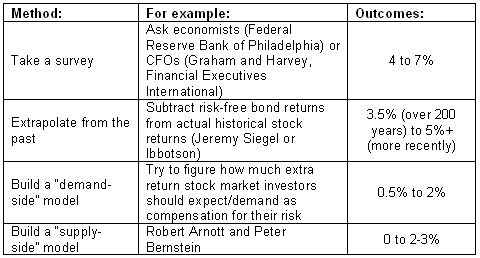It was Lao Tzu who stated several millenia ago that “those who have knowledge don’t predict and those who predict don’t have knowledge”, but nonetheless those that would have us believe they are the smartest minds in the market feel annually obliged to predict.
This year the average forecast from a group of 8 brokers for the FTSE 100 at year end 2012 is 5783 representing a gain of 3.8%. If those predicting such numbers don’t have knowledge and we know ourselves to be fools then perhaps we can’t do any worse by attempting to do some of the thinking ourselves. The goal of this article is to give a sweeping overview of the key drivers of share prices as understood by many of the best minds in finance and reflect on the optimal portfolio strategy for the prevailing environment.
There are four major influences on the direction of equity indices at any point in time, namely valuation, momentum, monetary and sentiment factors. While these factors may be argued over I would surmise that most additional factors (economy, earnings growth) can be bundled into one of these major categories.
Valuation- does it drive the Stock Market?
The conclusive evidence is that in the short term it doesn’t, but in the long term it does. The stock market has a tendency to gyrate over business cycles from excessive overpricing to excessive undervaluation. In order to find a value for the stock market, most investors start with the current and forecast PE ratio. Our calculations show that the median forecast PE Ratio of stocks in London stands at 13.8x with a dividend yield of 3.73% - near the long term historical norms and cheaper than the US. But profit margins are extremely high at present (at something like 9% in the US) which have historically always reverted to their long run averages - could the profits be at threat of a reversal making the PE higher than it looks? The current raft of earnings downgrades from brokers seems to back up this suspicion.
So if you can’t trust current earnings to value the market what do you do? One sage with an answer is Professor Robert Shiller, Yale Professor of Finance, who believes that using current earnings completely ignores the bigger picture of where we are in the business cycle. He calculates the current P/E ratio…











